Brands
Brewing the Perfect Cup of Content
Not many industries can guarantee their products are on hand when people sit down at their computers in the morning, but coffee retailers can.
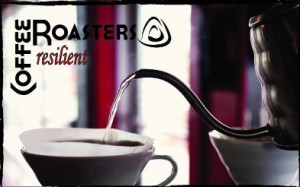 For many, drinking coffee is a ritual, and savvy coffee content managers know that capitalizing on this common visceral reaction to the beverage provides a rich source of content.
For many, drinking coffee is a ritual, and savvy coffee content managers know that capitalizing on this common visceral reaction to the beverage provides a rich source of content.
Social product
“Coffee creates a communal experience, even on social media, where people wake up to check their Facebook and Twitter feeds, coffee in-hand,” says Diane Geurts, director of marketing and public relations for Tully’s Coffee retail stores. She oversees content management for the company, which owns 47 stores in Washington and California.
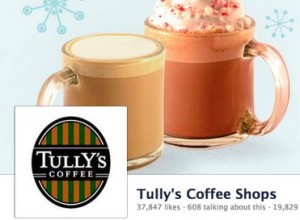 “We let our fans know when we have new products in-store, whether it’s a promotional beverage like eggnog latte, a limited reserve coffee or a fresh salad,” Geurts said.
“We let our fans know when we have new products in-store, whether it’s a promotional beverage like eggnog latte, a limited reserve coffee or a fresh salad,” Geurts said.
The company strives to make its content, which goes out to more than 37,000 Tully’s Facebook fans and 9,000 Twitter followers, a seamless expression of the retail brand experience, she said.
“Our stores are warm and inviting, with friendly baristas who know their customers. From a social media perspective, we try to recreate that same voice, inviting coffee lovers at home to start their day with not just a cup of coffee, but a smile,” Geurts said. “As a predominately Pacific Northwest retail experience, we also leverage our region’s natural beauty. It can be inspiring to see a picture of a sunrise over Elliott Bay with the Space Needle in the background.”
Artisan roasters
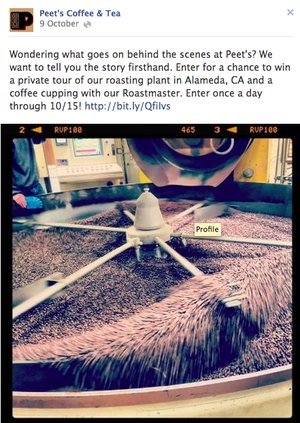
It is thanks to the giant coffee machine, Starbucks, with 8,000 locations and 33 million Facebook fans, and its precursor Peet’s Coffee and Tea, based in the San Francisco Bay area with dozens of outlets in six states, that coffee has garnered an impressive following.
Artisan coffee roasters and retailers like Wes Heyden, owner and operator of Roasters Coffee, are grateful.
“Starbucks, Peet’s and Dunkin Donuts brought in the masses, and now that those business models have gotten America hooked on coffee, interdependent artisan coffee roasters and retailers have a chance to teach people that you haven’t tasted real coffee until you’ve tried a cup of Kenyan coffee roasted perfectly by a local small batch roaster,” he said. “Coffee is much like wine. It’s created to be savored and experience, and this all makes for great content.”
Local marketing
According to Heyden, content is responsible for a recent surge in sales at Roasters, which has stores in Washington state.
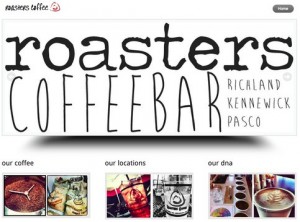
“The following we gain from raving fans spreading our brand through word of mouth is immeasurable,” he says. “We’ve used every corner of the internet, including Yelp, Facebook, Twitter, blogs, Instagram, Tumblr, Vimeo and YouTube. And we’ve built a huge fan base over the last few years with a texting service that sends personalized promos.”
In keeping with their artisan image, Roasters has also focused on a community-based brand image, which features their “Think Local” campaign.
An unstoppable trend
Specialty “third wave” coffee companies like Roasters focused on delivering high-quality artisan coffee with a local twist promise to continue to offer steady content material.
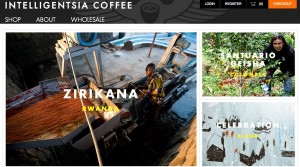 “Take a look at Stumptown, Victrola, Handsome, Four Barrel, Gimme Coffee and Intelligentsia inhabiting the latest specialty coffee cities like Portland, Seattle, LA, San Francisco, New York and Chicago, and you’ll see a rich source of coffee content just ready to blow,” says Heyden. “The education alone regarding what coffee is and where it’s going will last for a long time.”
“Take a look at Stumptown, Victrola, Handsome, Four Barrel, Gimme Coffee and Intelligentsia inhabiting the latest specialty coffee cities like Portland, Seattle, LA, San Francisco, New York and Chicago, and you’ll see a rich source of coffee content just ready to blow,” says Heyden. “The education alone regarding what coffee is and where it’s going will last for a long time.”
Get better at your job right now.
Read our monthly newsletter to master content marketing. It’s made for marketers, creators, and everyone in between.




